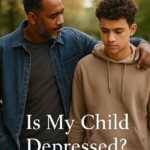
Is My Child Depressed? A Parent’s Guide to Spotting the Signs Early
As parents, we all want our children to be happy and healthy. But sometimes, emotional struggles aren’t easy to see—especially during the teen years when mood changes can be common. Depression in children and teens is real, and often overlooked. The good news is that with the right support, early intervention can make a lasting difference.
This post will help you understand the signs of depression, what to watch for, and how to take the next step toward professional support.
🧠 What Depression Can Look Like in Kids and Teens
Depression isn’t just “feeling sad.” In young people, it can show up in many different ways. Common signs include:
Changes in mood: Persistent sadness, irritability, or unexplained tearfulness.
Loss of interest: Pulling away from friends, activities, or hobbies they once enjoyed.
Changes in sleep or appetite: Sleeping too much or too little, changes in eating habits.
Drop in school performance: Difficulty concentrating, falling grades, or skipping classes.
Low energy: Constant fatigue or appearing “slowed down.”
Expressions of hopelessness: Saying things like “What’s the point?” or “I don’t matter.”
Physical complaints: Frequent headaches or stomachaches with no medical explanation.
Thoughts of self-harm or suicide: Any mention of this must be taken seriously and addressed immediately.
👉 Note: These signs can appear gradually or suddenly. A pattern lasting more than two weeks may be a red flag.
(See: Mayo Clinic — Teen Depression)
📋 Take a Quick Self-Check: Is Your Child at Risk?
We’ve created a free, confidential online screening tool based on evidence-based assessments to help parents understand whether their child may be showing signs of depression.
👉 Take the Child & Teen Depression Self-Check
The questionnaire takes just a few minutes and provides a clearer sense of whether it might be time to speak with a mental health professional.
⚠️ Important: This tool is intended for educational purposes only and does not provide a medical diagnosis. If you’re concerned, consider consulting a qualified therapist or doctor for a comprehensive evaluation.
🪜 Next Steps If You’re Concerned
1. Start the conversation — Let your child know you’ve noticed changes and that you care. Listen without judgment.
2. Consult a professional — A licensed therapist can evaluate symptoms and recommend next steps.
3. Create a support plan — This may include therapy, lifestyle changes, and coordination with schools or pediatricians.
4. Stay involved — Parental involvement is a key factor in a child’s recovery and resilience.
(See: American Academy of Pediatrics — Depression in Children and Teens)
🧑⚕️ We’re Here to Support You
At Mind Centered Counseling, our team of compassionate therapists understands the unique emotional challenges children and teens face. We offer virtual therapy sessions across New York State and in-person appointments at our Commack and Queens Village locations.
👉 একটি বিনামূল্যে পরামর্শ বুক করুন
👉 Text Us Confidentially
❓ Frequently Asked Questions
Can children really get depressed?
Yes. Depression can affect children as young as 6, though it often appears in adolescence. It’s not a phase—early support matters.
What’s the difference between normal teen mood swings and depression?
Mood swings are temporary. Depression lasts at least two weeks and interferes with daily functioning, relationships, and school.
Is therapy confidential for minors?
Yes—with certain exceptions for safety. Therapists discuss confidentiality boundaries with both parents and children during intake.
📌 Key Takeaway
Depression in children and teens is treatable—but only if we recognize the signs and act early. You don’t have to figure it out alone. Help is available, and your child’s well-being is worth every step.
👉 Take the Depression Self-Check
👉 Book a Consultation
✍️ Originally published by Mind Centered Counseling — Serving families across New York State, both virtually and in person.











